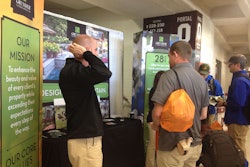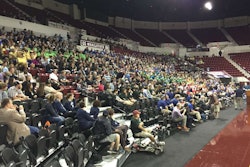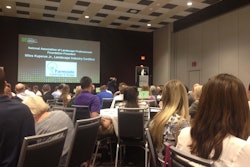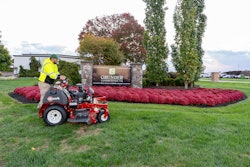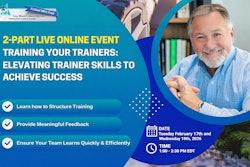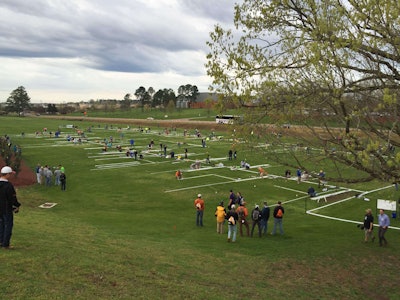 The National Collegiate Landscape Competition, now in its 40th year, drew more than 700 student competitors from 62 schools.
The National Collegiate Landscape Competition, now in its 40th year, drew more than 700 student competitors from 62 schools.Photo: David Rountree
Most college students on St. Patrick’s Day would not be spending their evening in an auditorium listening to a speaker discuss industry trends – even if the business is known as the green industry. Even so, a roomful of intrepid landscaping students filled Bost Auditorium at Mississippi State University to do just that.
The presentation, which was among numerous educational opportunities during this week’s National Collegiate Landscape Competition, was part of a career development series run by Ewing Irrigation and Hunter Industries. The two companies have been sponsoring irrigation events at NCLC for 23 years and took over handling the career development series a few years ago.
“I think both of our companies feel so strongly about the importance of this event’s not just being about competition,” said Lynda Wightman, industry relations manager for Hunter Industries. “It’s also so much about the education.”
NCLC workshops held earlier this week also were part of the career development series, providing students an opportunity to learn things that aren’t offered in the classroom or, in some cases, just to get a refresher.
Recently, Ewing and Hunter added on an hour-long presentation featuring a guest speaker on topics related to what the students may encounter in the marketplace or in the field.
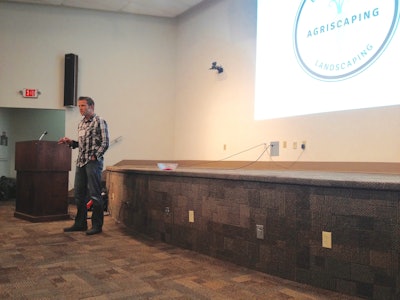 Keynote speaker Justin Rohner is CEO of Agriscaping Technologies, which creates landscapes filled with edible plants.
Keynote speaker Justin Rohner is CEO of Agriscaping Technologies, which creates landscapes filled with edible plants.Photo: Jill Odom
This year’s topic was sustainability and edible landscaping, which are two trends that show no sign of slowing down. The guest speaker was Justin Rohner, CEO of Agriscaping Technologies, a company known for creating landscapes filled with edible plants.
He launched his presentation by explaining how far food has to travel to reach the cities where it will be sold. Currently, trucks have to travel an average of 1,500 miles to get food to people and Rohner said that if all trucking stopped, most cities would have about a four-day food supply.
“I think it’s important for all of you to know because it’s likely to affect you and your career and the career choice you have moving forward from today – which I hope is different after I’m done talking,” Rohner said.
“If it’s not different, you fell asleep, because there’s something amazing going in the world right now and it’s never happened before. This is the first time in history, this is in 2015, that more people live in cities than on or near farms – just shifted, just last year.”
As part of this shift, people are beginning to realize the need for more locally grown food. Since 2008 there has been a 38-percent increase in the number of Americans who grow some of their own food, according to Rohner.
The challenge for people trying to grow their own food, Rohner says, is that they’re mostly homeowners and urban farmers who struggle with edible gardening because they lack the knowledge and infrastructure the landscaping industry has.
Another problem Rohner sees is the glut of information on the Internet.
“When you start trying to learn about how to grow food where you live, people go on the Internet to find information, but guess what you don’t find?” he said. “You don’t find localized information. You find every hack job out there trying to figure out how to grow something.”
With the shrinking size of yards, he said, instructions on seed packets are no longer applicable either, as there are rarely locations in urban areas that offer full sun.
“As we keep getting more urban, full sun is going to become less and less of an available resource, so we have to find new ways to grow,” he said. “We have to change the way that we think about food and how it grows.”
Americans who can boast of the greatest knowledge on growing food are retiring or being diagnosed with dementia, he said, meaning much of the information that needs to shared is actually being lost.
“Your innovations are going to be the most paramount thing in this industry moving forward,” Rohner said. “The past is not so much what we have to learn from now; it’s new creations. It’s the ideas you’ve got lodged in your heads right now that you think might work, and we need you.”
Rohner urged the college students not to allow fear of failure to get in their way. Instead, he told them, ask why an idea can’t work. To him, the curious are the ones who drive new economies because they begin asking questions and get the information they need.
Agriscaping Technologies has created standardized ways to grow foods in microclimates and has flipped the way people view landscapers – at least once Agriscaping representatives have explained that the clients’ landscapes will make them money instead of costing them money.
“Every square foot is worth something,” he said. “Ten bucks a year! When owners learn about agriscaping, we usually get, ‘Wait I can increase my budget now because this is going to provide me with food.’”
Rohner has set up a network known as Utopian Harvest, which is used by clients to sell the extra edibles they’ve grown.
After explaining how Agriscaping Technologies works and how the students themselves can become certified in edible landscaping, Rohner announced that for that night only they could sign up for an Edible Landscaping Grant sponsored by Ewing Irrigation and Hunter Industries.
“I love grants because it (the company awarding the assistance) doesn’t think so much about your past experience as much as it’s looking at your passionate interest in moving forward,” Rohner said.

